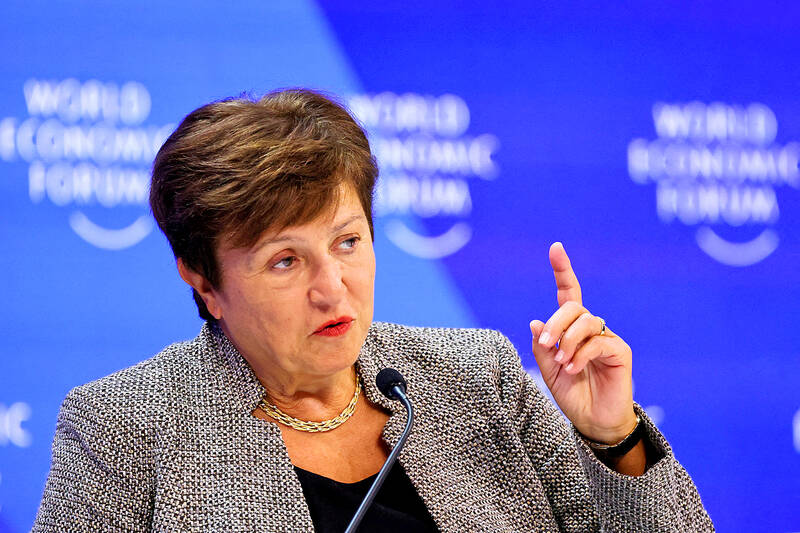IMF managing director Kristalina Georgieva said yesterday she is confident about the economic outlook despite uncertainties around war and geopolitics as the global economy has remained resilient.
In a speech at the World Governments Summit in Dubai, Georgieva said the IMF would publish a paper today that shows phasing out explicit energy subsidies could save US$336 billion in the Middle East, equivalent to the economies of Iraq and Libya combined.
She added that in addition to savings, eliminating regressive energy subsidies “discourages pollution, and helps improve social spending,” in a copy of the speech published on the IMF Web site.

Photo: Reuters
In its latest regional economic update published last month, the IMF revised its GDP growth forecast for the Middle East and North Africa region downwards to 2.9 percent this year, due in part to short-term oil production cuts.
“While uncertainties are still high, we can be a bit more confident about the economic outlook, because the global economy has been surprisingly resilient,” she said in the speech.
Speaking about the conflict in Gaza, Georgieva warned of widening consequences.
“This exceptionally uncertain moment compounds the challenges of economies that are still recovering from previous shocks. And further widening of the conflict would aggravate the economic harm,” she said.
Separately, Ukraine is considering a plan — including expanded domestic bond sales, tax hikes and spending cuts — to plug a hole in its budget in a bid to secure money from the IMF if crucial US aid remains blocked.
Ukrainian officials intend to propose the plan to the IMF during a staff visit to Kyiv next week, according to people familiar with the matter. The measures are needed to assure the IMF that Ukraine can service its debts in case allies fail to provide aid, a condition for its US$15.6 billion loan program.
The IMF staff, led by the fund’s Ukraine mission chief Gavin Gray, is to visit Kyiv for three days starting today, prior to official talks on Ukraine in neighboring Poland, the people said. The visit comes ahead of the IMF’s review of the loan program, which is to start later this month and would unlock a US$900 million tranche of aid.
Additional reporting by Bloomberg

Taiwan Semiconductor Manufacturing Co (TSMC, 台積電) would not produce its most advanced technologies in the US next year, Minister of Economic Affairs J.W. Kuo (郭智輝) said yesterday. Kuo made the comment during an appearance at the legislature, hours after the chipmaker announced that it would invest an additional US$100 billion to expand its manufacturing operations in the US. Asked by Taiwan People’s Party Legislator-at-large Chang Chi-kai (張啟楷) if TSMC would allow its most advanced technologies, the yet-to-be-released 2-nanometer and 1.6-nanometer processes, to go to the US in the near term, Kuo denied it. TSMC recently opened its first US factory, which produces 4-nanometer

GREAT SUCCESS: Republican Senator Todd Young expressed surprise at Trump’s comments and said he expects the administration to keep the program running US lawmakers who helped secure billions of dollars in subsidies for domestic semiconductor manufacturing rejected US President Donald Trump’s call to revoke the 2022 CHIPS and Science Act, signaling that any repeal effort in the US Congress would fall short. US Senate Minority Leader Chuck Schumer, who negotiated the law, on Wednesday said that Trump’s demand would fail, while a top Republican proponent, US Senator Todd Young, expressed surprise at the president’s comments and said he expects the administration to keep the program running. The CHIPS Act is “essential for America leading the world in tech, leading the world in AI [artificial

REACTIONS: While most analysts were positive about TSMC’s investment, one said the US expansion could disrupt the company’s supply-demand balance Taiwan Semiconductor Manufacturing Co’s (TSMC, 台積電) new US$100 billion investment in the US would exert a positive effect on the chipmaker’s revenue in the medium term on the back of booming artificial intelligence (AI) chip demand from US chip designers, an International Data Corp (IDC) analyst said yesterday. “This is good for TSMC in terms of business expansion, as its major clients for advanced chips are US chip designers,” IDC senior semiconductor research manager Galen Zeng (曾冠瑋) said by telephone yesterday. “Besides, those US companies all consider supply chain resilience a business imperative,” Zeng said. That meant local supply would

BIG INVESTMENT: Hon Hai is building the world’s largest assembly plant for servers based on Nvidia Corp’s state-of-the-art AI chips, Jalisco Governor Pablo Lemus said The construction of Hon Hai Precision Industry Co’s (鴻海精密) massive artificial intelligence (AI) server plant near Guadalajara, Mexico, would be completed in a year despite the threat of new tariffs from US President Donald Trump, Jalisco Governor Pablo Lemus said. Hon Hai, also known as Foxconn Technology Group (富士康科技集團), is investing about US$900 million in what would become the world’s largest assembly plant for servers based on Nvidia Corp’s state-of-the-art GB200 AI chips, Lemus said. The project consists of two phases: the expansion of an existing Hon Hai facility in the municipality of El Salto, and the construction of a